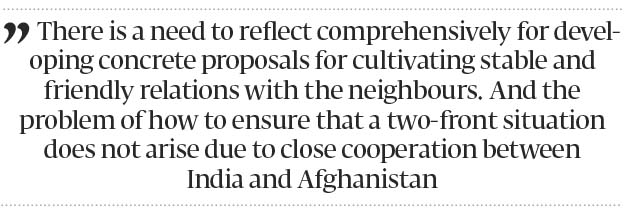Short-term gains are long-term losses
This can be described as the shortsighted governance and political management

The writer is an independent political and defence analyst. He is also the author of several books, monographs and articles on Pakistan and South Asian affairs
A large number of states find it difficult to identify long-term goals for state institutions and processes. There is hardly any well-articulated strategy for moving the political, social and economic systems in a particular direction. Rather, policy-making deals only with immediate issues or opts for temporary arrangements to deal with the current situation rather than thinking in terms of a long-term strategy to cope with the problems. This is described as the morning-to-evening approach to governance and political management.
Most developing countries, including Pakistan, adopt this kind of tactical approach to issues and problems. The immediate questions are temporarily addressed and there is no effort to find permanent solutions to the diplomatic and governance problems. This approach may enable a regime to stay afloat. However, the political system moves from crisis to crisis with a lot of uncertainty about the future. It is extremely difficult to predict about the endurance of such a political system beyond a couple of months. Every new political challenge appears to threaten the political process.
Another tendency is to delay decision-making and let the issue fester as along as possible. The issues are decided keeping in view the immediate exigencies rather than on the basis of long-term considerations arising out of the national goals and agendas.
The highest level political decision-making in Pakistan is often made on transient considerations. The primary considerations are immediate gains on partisan considerations and the people are judged for key political and administrative positions on loyalty rather than professionalism and an independent outlook. The more loyal a person is to the political leader the greater are his chances of being selected for government positions. A person holding such a position is expected to demonstrate loyalty in his decision-making and in his disposition towards politics. It was not surprising that on April 6th the Sindh Governor, Muhammad Zubair Omar, attributed all credit for the successful security operation in Karachi to Prime Minister Nawaz Sharif. Before assuming office, he was known as an energetic defender of Sharif’s policies.

Instead of devising the long-term socio-economic and diplomatic strategies, the focus of the federal government has so far been on its political survival in view of the political onslaught by the PTI. The PPP, led by Asif Ali Zardari, has been tamed by Sharif, although its leadership periodically engages in criticism of the PML-N government to deny the perception of subtle cooperation between Zardari and Sharif. Imran Khan’s PTI is persistent in its challenge to the ruling PML-N. The Pakistan Awami Tehreek of Tahirul Qadri also gets into anti-Sharif disposition from time to time. However, as long as Qadri stays abroad his party does not have much chance in Pakistan.
Other policies to deal with the immediate challenges include how to cope with the diplomatic pressures generated by India as a reaction to the death sentence to Indian spy Kulbhushan Jadhav. The civilian government appeared to be taken by surprise by this judgment and took time to publicly defend it. Other important issues include the relations with Afghanistan; India’s periodic firing across the LoC in Kashmir; internal terrorism and especially their networks and hideouts in Punjab.
These are long-term issues that require a well-thought out strategy to keep the political initiative with the federal government. However, the federal government pursues a ‘reactive’ policy to deflect the political and diplomatic pressures. There is a need to reflect comprehensively for developing concrete proposals for cultivating stable and friendly relations with the neighbours. And the problem of how to ensure that a two-front situation does not arise due to close cooperation between India and Afghanistan, needs a carefully managed policy of wooing Afghanistan rather than viewing its government as a puppet of India.
The PML-N government at the federal level and in Punjab is not forthcoming on controlling urban-based terrorism, out of fear of losing the votes of political far-right and Islamists. Similarly, the civilian government is reluctant to fully implement the National Action Plan, especially the management of religious seminaries to avoid alienating them.
The policy of short-term gains has focused attention on building the personality cult of the leader through advertisement campaigns in print and broadcast media. All welfare work is undertaken in a selective manner, targeting the support base of the PML-N in Punjab. Such welfare projects are labelled as the personal favour by the leader.
This can be described as the shortsighted governance and political management because it creates the leader’s personality oriented political system, characterised by highly partisan use of state patronage and resources. It also tolerates corruption and other money making activities by all those riding on the ruling party’s bandwagon. Such policy measures can neither strengthen democratic institutions and processes nor offer the long-term solutions to Pakistan’s festering socio-economic and political problems.
Published in The Express Tribune, April 20th, 2017.
Like Opinion & Editorial on Facebook, follow @ETOpEd on Twitter to receive all updates on all our daily pieces.















COMMENTS
Comments are moderated and generally will be posted if they are on-topic and not abusive.
For more information, please see our Comments FAQ